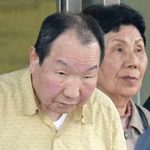
On March 24, 2025, Iwao Hakamada was awarded just over $217 million yen ($1.4 million) in compensation after spending 46 years wrongfully incarcerated on Japan’s death row. According to Mr. Hakamada’s legal representative, Hideyo Ogawa, this award marks the “highest” compensation ever provided for a wrongful conviction. Mr. Hakamada, who was exonerated last year, is only the fifth death-sentenced prisoner to receive a retrial in post-World War II Japan, all of which have resulted in exonerations. Aside from the United States, Japan is the only other G7 nation to retain the death penalty. Although a 2024 government survey found that over 80% of Japanese respondents saw the death penalty as “unavoidable,” the percentage of respondents who favor abolition nearly doubled from the last survey conducted five years ago.
I used to accept the death penalty without giving it much thought. But after what happened with Iwao, I became against the death penalty. It is a crime for a human being to kill another human being, no matter what the government says.
Mr. Hakamada was formally acquitted on September 26, 2024 of the 1966 quadruple murder of his former boss and family. Judge Kunii Tsuneishi of the Shizuoka District Court ruled the blood-stained clothing used to convict Mr. Hakamada was fabricated long after the murders. Although Mr. Hakamada initially confessed to the killings after enduring 20 days of troubling interrogations by police — who he alleged beat him — he retracted his confession during trial and has maintained his innocence since. In 1968, Mr. Hakamada was sentenced to death by a 2 – 1 three-judge panel.. His death sentence was confirmed in 1980, and his legal team first called for a retrial in 1981. A retrial was granted in 2014 based on DNA testing of evidence that showed no match to either Mr. Hakamada or the victims. That same year, Mr. Hakamada was released from prison due to his age and compromised mental state.
Judge Hiroaki Murayama’s 2014 decision to grant Mr. Hakamada a retrial made him only the fifth death-sentenced prisoner to receive a retrial in post-war Japan; all five death-sentenced prisoners who have received a retrial have been exonerated. In an interview with Agence France Presse, now-retired Judge Murayama explained, “retrial is supposed to be the last possible measure to save the wrongfully incarcerated, but the system is not functioning as it should.” Judge Murayama said he made it his “team’s biggest priority to speed up deliberations” in Mr. Hakamada’s case, and he was “worried sick” Mr. Hakamada might die before the legal process concluded. Retrials are so rare in Japan critics have likened it to an “unopenable door.” From 2017 to 2021, just one percent of about 1,150 retrial applications from all convicted were granted. In the aftermath of Mr. Hakamada’s exoneration, conversations surrounding reform have gained momentum. On March 28, 2025, Japan’s justice minister Keisuke Suzuki announced that a panel of legal experts will study the current retrial process.
A system “so dependent on chance or luck isn’t a system at all.”
Every five years, the Japanese government conducts a survey evaluating public sentiment surrounding the death penalty; the latest survey collected responses from 1,815 people from October to December 2024. Although over 80% of respondents, or 1,508 people, said the death penalty was “unavoidable,” 34.4% said they would support abolition if “circumstances change.” The survey also found that 16.5% of respondents believe the death penalty should be abolished, which is nearly double what it was in 2019 (9%). Of those who favor abolition, 71% explained that their support was due to the irrevocable nature of the punishment, up from 50.7% in 2019. However, it’s important to note that the government did not compare current surveys to past surveys due to a change in data collection from in-person interviews to mailed-in responses, prompted by the coronavirus pandemic. And in general, the government’s survey design has been repeatedly criticized by the Japan Federation of Bar Associations, which cautions the public from incorrectly equating those who see the death penalty as “unavoidable” as support for retaining the death penalty.
AFP, Japan justice minister calls for probe into ‘unopenable’ retrial system, Japan Times, March 29, 2025; AFP, Japan’s retrial system under scrutiny as son fights for death row mother’s case, MalayMail, March 29, 2025; Tomohiro OSAKI, ‘No Warning’: The Death Penalty In Japan, Barron’s, March 28, 2025; AFP, Ex-judge fights Japan’s ‘unopenable door’ retrial system, France24, March 26, 2025; AFP, Exonerated prisoner awarded $1.4m after 46 years spent on death row in Japan, The Guardian, March 25, 2025; Chris Lau and Yumi Asada, World’s longest-serving death row prisoner awarded $1.4 million after acquittal – that’s $85 for each day, CNN, March 25, 2025; Francis Tang, Over 80% of Japanese say death penalty system is ‘unavoidable’, The Japan Times, February 22, 2025; ‘I couldn’t stop crying for an hour’ – meet the 92-year-old campaigner who saved her brother from execution, Amnesty International, February 14, 2025; Japan: Death Penalty Acquittal Shows Need for Legal Reform, Human Rights Watch, January 16, 2025; Japan: Acquittal of man who spent 45 years on death row pivotal moment for justice, Amnesty International, September 26, 2024;

